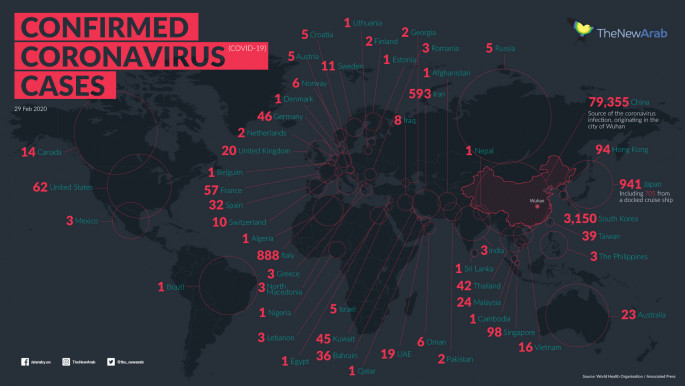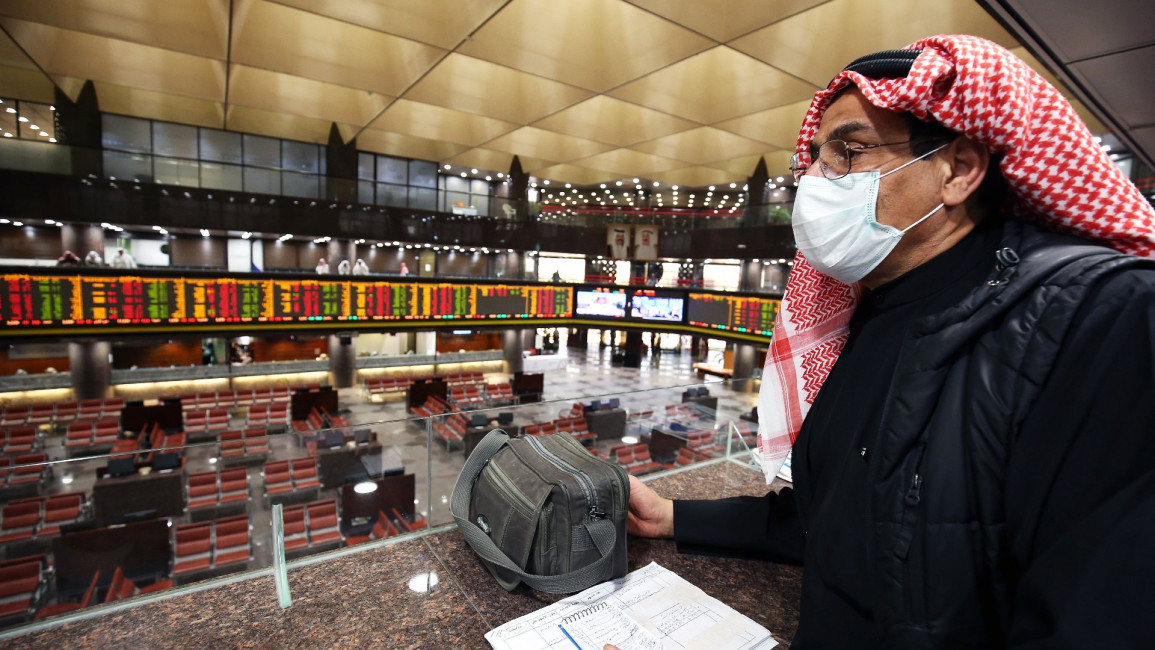Gulf stock markets plunge amid coronavirus fears
All of the seven exchanges in the Gulf Cooperation Council (GCC), which were closed on Friday and Saturday for the Muslim weekend, were hit as oil prices dropped below $50 a barrel.
The Saudi bourse, the region's largest and one of the world's top 10 share markets, was down 3.5 percent at mid-session.
Energy giant Saudi Aramco dropped to its lowest level since listing on the Saudi stock market three months ago, shedding 2.9 percent to just marginally above its IPO price, before recovering slightly.
The market value of the world's largest company, which pumps some 10 million barrels per day, dropped to $1.73 trillion, only $20 billion above its value when it was listed to much fanfare in the record-breaking IPO.
The region's slide was led by Kuwait Boursa, where the All-Share Index fell 10 percent, triggering its closure. Kuwait's bourse was closed for most of last week for national holidays.
The Dubai Financial Market dipped 4.5 percent, while its sister market in Abu Dhabi was down 3.3 percent an hour after opening.
Bahrain's bourse lost 3.6 percent and the Muscat Securities Market in Oman edged down 1.1 percent.
"GCC equities witnessed a downfall as panic over coronavirus spread across the region," M.R. Raghu, head of research at Kuwait Financial Centre (Markaz), told AFP.
"Initial expectations that the outbreak would be contained within China have proved elusive, as a large number of international cases continue to be reported," he said.
At least 115 cases of the coronavirus have been reported by the Gulf states so far, with the majority of infections among people returning from pilgrimages to Iran.
Global contagion
Global stocks slumped on Friday, marking the largest weekly drop since the 2008 global financial crisis, as concerns grew that the virus spread could wreak havoc on the world economy.
Crude oil prices tumbled as well and analysts said central banks, especially the US Federal Reserve, might have to shift into crisis-resolution mode with urgent interest rate cuts.
All six GCC states - Bahrain, Kuwait, Oman, Qatar, Saudi Arabia and the United Arab Emirates - have taken measures to curb the spread of the virus, including cutting off transport links with neighbouring Iran, where some 43 people have died.
Saudi Arabia also banned Muslim pilgrims from travelling to perform the "umrah", or minor pilgrimage, to the holy city of Mecca.
The move is likely to deprive the kingdom of billions of dollars in spending by millions of pilgrims and also creates uncertainty over the annual hajj pilgrimage scheduled for July.
|
||
The health crisis threatens to further undercut Gulf economies, which are battling a downturn and struggling to wean themselves from a decades-old energy addiction.
The Gulf states count China as their main trading partner and crude buyer, soaking up about a fifth of their oil.
But China's energy demand has sagged as authorities lock down millions of people to prevent the spread of the illness, dubbed COVID-19, with major knock-on effects for a global economy that is dependent on a buoyant China.
The powerhouse accounts for one third of the growth in oil demand.
The Gulf share sell-off came as the United States and Australia reported their first fatalities and China reported a fresh spike in infections.
Worldwide, nearly 3,000 people have been killed and about 87,000 infected since the virus was first detected late last year in the central Chinese city of Wuhan.
"The news flow today is quite negative and it will make the narrative between now and Monday morning even more important than it was on Friday," said Matt Maley, an equity strategist at Miller Tabak & Co.
Maley said it was still too early to look at worst-case scenarios.
"That said, today’s markets are highly impacted by momentum-based mechanised trading. If things get going in one direction, it’s very hard to turn around," he told Bloomberg News.
Follow us on Facebook, Twitter and Instagram to stay connected



